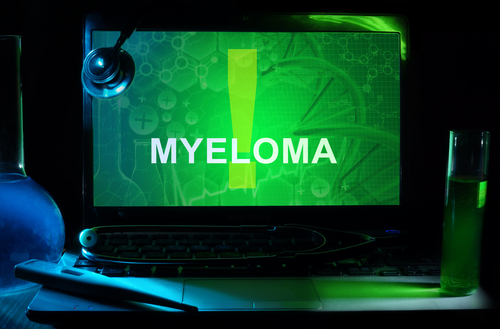Keytruda Seen to Increase Efficacy of Pomalyst and Dexamethasone in Myeloma Trial

A Phase 2 trial has shown that Keytruda (pembrolizumab) increases the effectiveness of Pomalyst (pomalidomide) and dexamethasone in patients with relapsed/refractory multiple myeloma (RRMM).
The study also shows that PD-L1 activity on myeloma cells and PD-1 on bone marrow-infiltrating T-cells are possible biomarkers for the effectiveness of PD-1 (programmed death 1) blockade.
The Phase 2 study, “Pembrolizumab, Pomalidomide and Low Dose Dexamethasone for Relapsed/Refractory Multiple Myeloma,” was published in the journal Blood.
The inhibition of PD-1 and its co-inhibitory ligands PD-L1 and PD-L2 has shown extraordinary long-lasting remission in subgroups of patients with solid tumors and hematologic malignancies. As a result, this pathway represents a promising therapeutic target against cancer.
The Phase 2 single-center trial (NCT02289222) tested Keytruda, a humanized monoclonal antibody against PD-1, in combination with Pomalyst and low-dose dexamethasone in 48 RRMM patients whose average age was 64 (age range 35 to 83 years).
Among the participants, 35 (73%) did not respond to an immunomodulatory agent such as Thalomid (thalidomide) or Revlimid (lenalidomide) or a proteasome inhibitor such as Velcade (bortezomib) or Kyprolis (carfilzomib). Also, 31 patients (70%) had received an autologous stem cell transplant.
The trial’s main objectives were the safety and effectiveness of the treatment by assessing the objective response rate (ORR), progression-free survival (PFS), and duration of response (DOR), and exploring potential biomarkers. The trial is expected to be completed in December 2018.
An ORR was observed in 29 of the 48 patents (60%), with a median DOR of 14.7 months. Median PFS was 17.4 months. This was considerably higher than the 32% ORR and four-month PFS seen in heavily-treated myeloma patients receiving Pomalyst and low-dose dexamethasone in the NIMBUS Phase 3 trial (NCT01311687).
In terms of safety, 19 patients (40%) had adverse reactions of grade 3-4 in which hematological toxicities, hyperglycemia, and pneumonia were the most frequent.
The biomarker analysis suggests that ORR to Pomalyst and Keytruda seems associated with PD-L1 expression on myeloma cells in 29 patients. In addition, the expression of PD-1 on infiltrating T-cells was detected in 38 patients, suggesting that T-cell infiltration in the tumor, independent of PD-1 expression, is associated with longer PFS.
The authors emphasized the preliminary nature of the trial’s results and the need for further confirmation studies with more patients, along with additional features of the bone marrow microenvironment to more clearly understand the processes at work.
“The combination of pembrolizumab, pomalidomide and low-dose dexamethasone shows promising durable clinical anti-myeloma activity; the results are encouraging and support an ongoing Phase 3 trial in patients with RRMM (NCT02576977),” the researchers wrote. “These promising results emphasize the therapeutic potential of immune cells in MM.”






